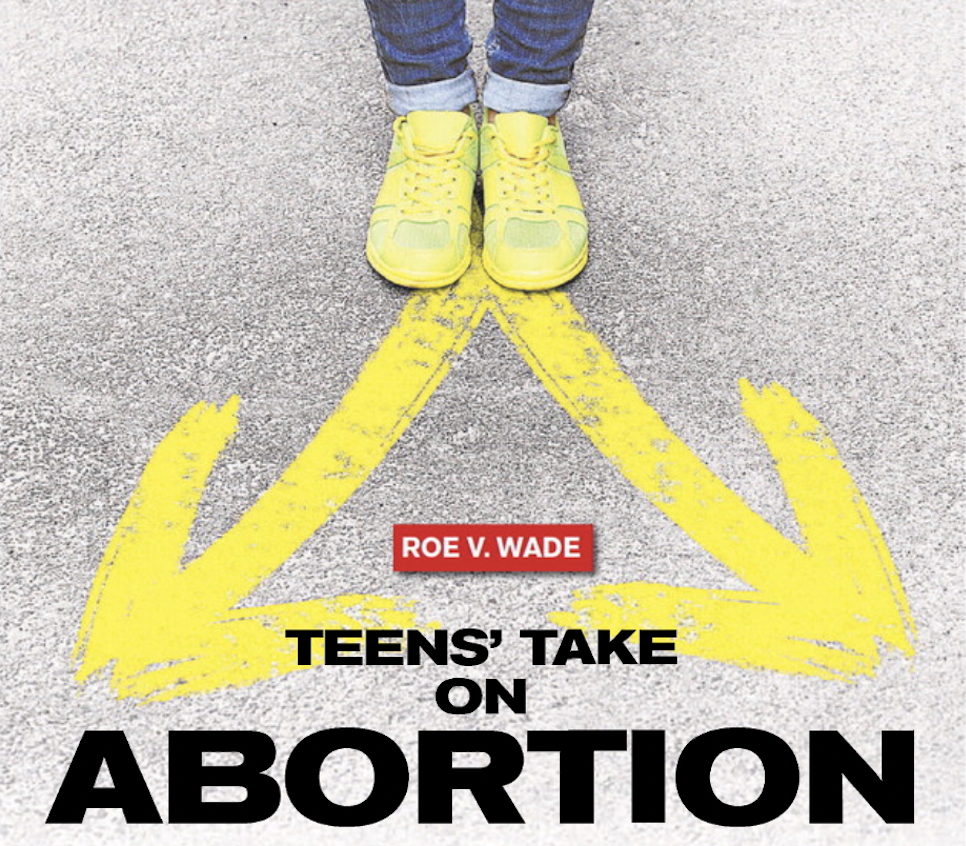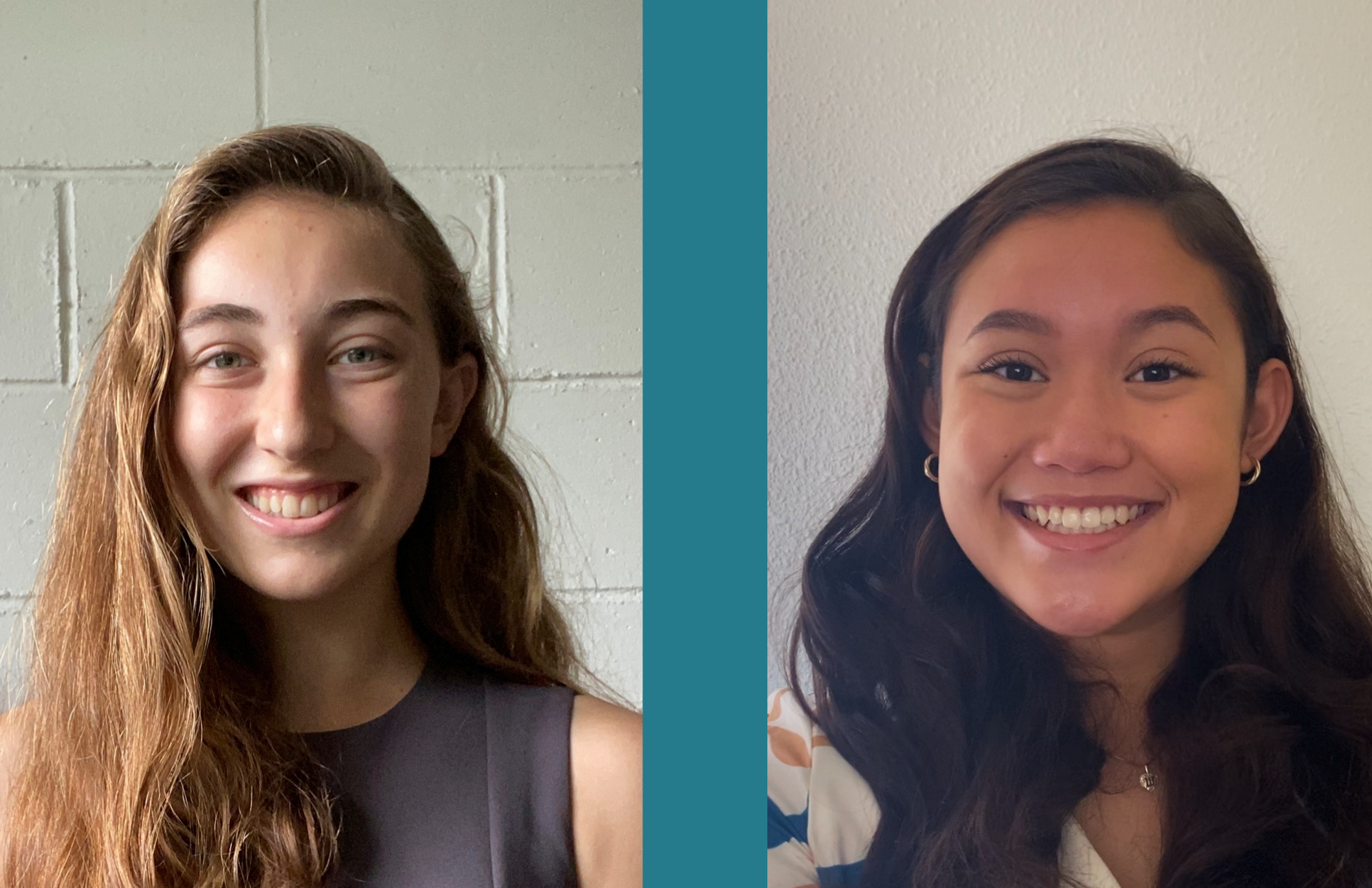
The following editorial was originally published in the Honolulu Star-Advertiser on Sunday, June 5, 2022 as part of the "Raise Your Hand" column in the Insights section.

Reproductive rights are basic human rights
By: Kira Stoetzer, St. Andrew's Priory graduate, c/o 2022 (left)
The legality of abortions are essential to protect a basic and fundamental human right. Denial of an abortion is a denial of health services and a violation of a woman’s rights.
Without safe access to abortions, pregnant women are putting their mental health, among other things, at risk. The abortion itself is not necessarily the determining factor in depression or a decreasing mental health, but rather the negative circumstances surrounding the pregnancy leading to a termination, such as socioeconomic stability, lack of support, an abusive partner, not being emotionally ready, or even sexual assault/rape.
In many cases, having an abortion is the reliever as opposed to the stressor. A woman never wants to have an abortion, and if she decides to have the medical procedure, she spent the time to thoroughly evaluate this choice to protect her life, security and choices. By preventing women from having an abortion simply because they have no medical reason, pro-life advocates and legislators are endangering the mental health and, in extreme cases, the lives of women during an emotional and physically taxing period of their life.
A consequence of making abortions illegal is that they can become dangerous. According to the World Health Organization, an estimated 30 women die for every 100,000 unsafe abortions in developed regions. Legal abortions provide a safe environment for women to seek a medical abortion with the lowest risk possible. Following Roe v. Wade (1973), the number of abortions that were provided annually did not necessarily increase, however, there was a lower complication rate.
Denial of an abortion is a denial of health services and a violation of a woman’s rights.
— Kira Stoetzer
Even though the Supreme Court ruled in favor of Roe stating that abortions are protected under the Constitution, there have been laws and cases that challenge that decision. The Texan law, Senate Bill 8, prohibits abortions after six weeks and enables private individuals, as opposed to the state, to enforce the law. In other words, any person could sue an abortion provider or someone who provides access to abortion care regardless of if they are aware, such as an Uber driver.
While the decision is not finalized for Dobbs v. Jackson Women’s Health Organization (2021), which argues if the Mississippi “Gestational Age Act” prohibiting abortions after 15 weeks is constitutional,Justice Samuel Alito’s draft decision was recently leaked. The draft stated that the Supreme Court was planning to overturn Roe v. Wade and leave the power to determine the legality of abortion to the states. Since then, thousands across the country have participated in marches advocating for the recognition and protection of women’s reproductive rights.
It takes two to create a child, and yet male accountability is not as important as a woman’s when it comes to an unwanted pregnancy. Women are the only ones blamed in society and in our government’s laws. Of all of the anti-abortion laws found across the country, there is rarely any mention of male accountability, even if the man encouraged her to go through with the procedure. If a woman is forced to raise a child by herself because the man was not held accountable, she must also balance other aspects of her life, which can be an impossible task.
Reproductive and abortion rights are a topic that is currently highly debated, even though these rights are fundamental. The Constitution protects the rights of all citizens under the due process clause in the 14th Amendment, and yet by restricting a woman’s access to health care, the United States is not doing what its founding document protects. Anti-abortion laws not only violate women’s rights, but they also threaten her mental health and life.
Pro-life has deep meaning, since together, we matter
By: Cheyenne Bajo, Kamehameha Schools graduate, c/o 2021 (right)
My story begins with my mother’s strength to keep her pregnancy — to keep me.
Eighteen years ago, my mother wept on the cold bathroom floor, her mind swimming. Like many other women, my mother was faced with an array of harsh realities that drove her to consider an abortion. Many find themselves basing this decision on socio-economic factors if they assume they cannot provide for a child. In a 2004 survey of 957 women having an abortion, 1 in 4 said their foremost reason for having the procedure was that they were not ready for a child and could not provide for them.
My mother was no different, facing financial difficulties, drug use before and during the pregnancy, poverty, and lack of familial assistance. She had many reasons to say she, too, was not ready for a child. Instead, she chose to keep me, and my life is a testament to why abortion should be the last resort, and why the 99% of abortions that are not promoted by cases of rape or incest should be reconsidered.
I spent many years grieving. Grieving the parent-sized holes in my life as it was tough to explain to my friends why I lived with my grandparents, why my dad wore an orange jumpsuit in every picture with me, or why the other moms on my softball team would take their daughters to get earrings while my mom was nowhere to be found.
I worked my entire life to move forward and found that through my academic pursuits, anything was possible. I graduated from Kamehameha Schools Kapalama Campus in 2021 and am now attending New York University on a full-tuition merit- based scholarship to study in the pre-med track. My mother intended to give me a fighting chance at life and now I intend to join the fight to preserve the lives of others.
Without the strength of my mother’s “Yes,” I would never be where I am today.
— Cheyenne Bajo
My life has been full of adversity but also beautiful. I experienced my mother’s troubles while on her hip. When I was 1 year old, there were days where we only had a pack of dry ramen noodles to eat during the day and we spent nights sleeping in a broken-down car. We struggled for the early parts of my childhood, and when my mother realized she could no longer properly take care of a baby, she alerted Child Protective Services. From that point on, I was raised by my foster grandparents. They provided me with what they had and allowed me the room to blossom into a life that many would not think possible.
Without the strength of my mother’s “Yes,” I would never be where I am today. It’s a strength that requires vulnerability, both hers and mine, to live life against the dominant narrative that says that both our choices were the “wrong” one.
The New York Times editorial board recently used the phrase “clusters of cells that have not yet developed into viable human beings” to describe a fetus in the womb, or what I would call a prenatal child. These dry words or phrases used are dehumanizing, allowing people to solely consider the mother’s rights, while ignoring the fact that we all were once “clusters of cells that have not yet developed into viable human beings.” This usage of language also hides the fact that during the time of most surgical abortions, a prenatal child has electrical activity in the brain and a beating heart. Where do we draw the line? My life mattered in those bits before birth and remains that way today.
Let’s not draw the line at six weeks, nine weeks, 21. The bottom line is that both lives matter, a mother’s and a child’s before and after birth.
To be vulnerable is to have the strength to break down your walls of comfort. Like my mother, I believe that though times may be trying, there will always be more to one’s story. My mother’s story is one I cannot neglect. As I was writing this article, my mom told me, “I struggled with my decision to keep you. I was a homeless drug addict and grappled with the fact that I could not take care of myself let alone a child, but I knew I couldn’t do away with the life I created.” Our stories began at the same point and time. “Though my living circumstances did not immediately get better I slowly began to gain control of my life. I gained strength through you. You were my hope at rock bottom."
I marvel at my mother’s grit and boundless love. Thank you, Mom, for your story matters as much as mine.
Related Articles
With its refreshing waters, aromatic scents of native greenery, and crisp breeze, Hawaii is
truly an island paradise. Alongside the locals, you may spot an abundance of tourists — more
than 200,000 of them on the islands on any given day. While tourism is a controversial topic
among locals, its importance to the local community and economy is undeniable.
